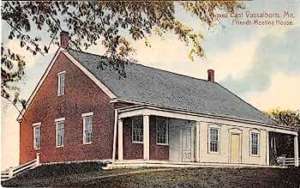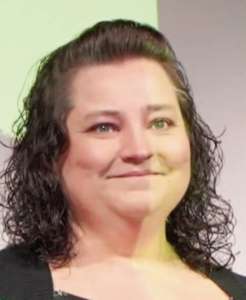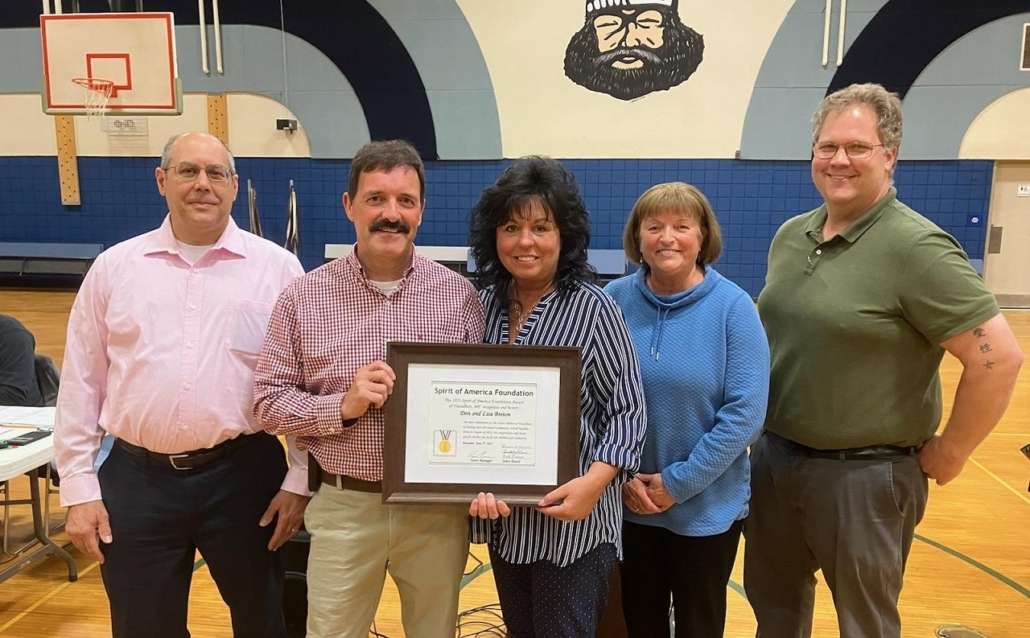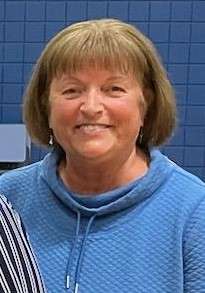
The Abel Jones House, on Jones Road, in South China Village, dates from 1815.
An address at the Vassalboro Historical Society
On Sunday afternoon, June 18, Joann Clark Austin, of South China, a semi-retired lawyer and self-described “fifth-generation China Quaker,” spoke on the local history of Quakerism at the Vassalboro Historical Society.
An Englishman named George Fox (July 1624 – Jan. 13, 1691) founded what became known as the Society of Friends, or Quakers, Austin said. Growing up in a multi-denominational society, Fox constantly questioned religious leaders, seeking a faith that was honest, non-commercial and peaceful.
He realized that the Bible, only recently available in English (the King James Bible was published in 1611), presented an image of Jesus as the exemplar of love, forgiveness, equality, cooperation and other traits he searched for. He felt Jesus talking directly to him, and “developed a personal relationship with a living, loving Jesus.”
Fox’s insight became the basis of the Society of Friends. He felt called to spread the news; Austin said his travels included visits to Rhode Island and Boston, where he confronted the Puritans.
Quakers were often persecuted, but persecution only made them more aggressive about preaching their doctrines, Austin said.
Their religious observances took the form of sitting together quietly, waiting to hear the inner voice. Sometimes, an on-line source says, “some participants would feel the presence of the Lord so strongly that they would begin to shake, or ‘quake'” – hence the name Quaker. It was intended as an insult, but Friends proudly claimed it.
Austin said that “Quakerism had a huge impact in Vassalboro and China,” more than in other parts of Maine. She explained that in 1771, British landowners, notably the Vassall family, had a surveyor named John Jones lay out lots in the wilderness that became Vassalboro.
Despite the difficulties of traveling to and in what was then a wilderness, and the further difficulties of clearing space to build a house, grow food crops and graze livestock, the lots sold, and there were Friends among the buyers.
Vassalboro and China Friends connected with Friends elsewhere. Doing title research for the Bristol Historical Society, Austin was amazed to find that a cemetery in Bristol with unmarked graves (typical of early Friends graveyards) had been deeded to Vassalboro Friends meeting.
By the 1750s and 1760s, Austin said, Friends were numerous enough in the American colonies to control governments in Rhode Island, New Jersey, Pennsylvania (founded as a haven for the group) and North Carolina.
The Revolution was not a good time for them, however, because one of their beliefs is that war is not a solution to problems. Many were pacifists and therefore were accused of Tory sympathies; and many left colonies like Massachusetts for the Maine frontier.
One Friend who came to Maine in 1777 was a New Yorker named David Sands, Austin said. Reaching Vassalboro, he and his companion were invited to the spacious home of a magistrate named Remington Hobby (some sources spell the name Hobbie).
Hobby welcomed them in his warm kitchen, where, in Quaker fashion, they sat in silence. Thinking his informality had offended his guests, Hobby had a fire built in the best parlor – where again they sat silently.
As Hobby began to wonder if these men were trying to make a fool of him, Sands broke his silence. “Art thou willing to be a fool?” he asked. “Art thou willing to be a fool for Christ?”
Sands converted Hobby, and on future visits helped Hobby increase the number of Friends in Vassalboro.
Austin diverted from history to explain how someone like Sands would decide to travel. The person – not necessarily a man – would feel a call from that internal voice, she said, and would tell the other members of his or her local meeting about it.
Members would decide whether the call was genuine and should be approved. They could, and often did, appoint a second member to accompany the traveler.
Local meetings were held weekly in a member’s house, until the group became too large and built a meeting house. There were also quarterly (four times a year) meetings that brought together regional groups, and yearly meetings with an even wider geographic spread.
Meeting houses were simple and unornamented. If a Friends group outgrew a meeting house and built a larger one, the first one would likely become some family’s home.
A feature of Friends meeting houses was a panel that dropped from the ceiling to divide the room in two, women on one side and men on the other. Each group would discuss the day’s issues and come to its own conclusion, with the women not being overborne by the men.
The process of reaching a decision at such a business meeting Austin called getting “the sense of the meeting.” It is not consensus, and not compromise, but hearing and attempting to answer each person’s concerns. If after discussion one member still disagrees, there is no decision.
Holly Weidner, a Vassalboro Friend, explained from the audience that since everyone in the meeting has within him or her the same divine spark, the clerk of the meeting, who is leading the discussion, has to find the place where everyone is satisfied.
Austin mentioned another Vassalboro Friend, John Damon Lang (May 14, 1799 – 1879), a mill-owner who was appointed and sent West by President Ulysses Grant in 1870 as one of nine Indian commissioners. The commissioners’ mission, according to their report, was to “civilize, educate and provide moral training to the original inhabitants.”
A handout Austin had prepared included photos of three China friends known internationally, Eli Jones (1807-1890), his wife Sybil (1808-1873) and their nephew Rufus (Jan. 25, 1863 -June 16, 1948). In her talk she mentioned Eli’s sister, Rufus’ Aunt Peace (1815 – 1907).
“Her name was Peace?” an audience member asked.
Yes, and the Jones genealogy in the China bicentennial history records women named Comfort, Grace, Mercy and Thankful.
Quakers in central Kennebec Valley
Friends, or Quakers, are important enough in the history of the central Kennebec Valley and surrounding region to merit a separate chapter in Henry Kingsbury’s 1892 county history, a chapter written for the book by Rufus Jones, of China.
China’s first settlers, in the summer of 1774, were a family named Clark: Jonathan, Sr., and Miriam and their four sons. Jones wrote that Miriam and two of the sons, Andrew and Ephraim, were Friends; Jonathan and the other two sons were not.
In addition to books written by and about noted China Quakers and other documents, tangible reminders of their presence include five buildings listed on the National Register of Historic Places and seven Friends cemeteries.

Friends Meeting House, in Vassalboro.
Three of the buildings have long been private homes, and two still are. In the order in which they were built, they are:
- The Abel Jones House, on Jones Road in South China Village, dates from 1815 and is one of several Federal-style houses still standing in town. Rufus Jones was born and spent his early childhood there. The South China Library Association now owns the building, barn and land.
- The Eli and Sybil Jones House on the northwest side of the intersection of Dirigo Road and Route 3 (Augusta Road), dates from 1833 and was the home of the famous missionaries.
- Pendle Hill, off the west side of Route 202 (Lakeview Drive) was built in 1916 and was Rufus Jones’ summer home until his death in 1948.
The older of the public buildings is the Pond Meeting House on the east side of Lakeview Drive. It dates from 1807 and was used for worship for years; it is now part of the Friends Camp,
The South China Community Church, built in 1884, began as a Friends meeting house, succeeding the Pond Meeting House. It is still a house of worship, now non-denominational.
According to the China bicentennial history, there are seven Friends cemeteries in China. The oldest is behind the Pond Meeting house; here is the grave of Jerusha Fish, daughter of Jonathan and Miriam Clark. Jerusha married George Fish, a British Friend who was lost at sea.
The next oldest China Friends cemetery is on the east side of Neck Road, near the site of a former meeting house. The earliest date in that cemetery is on the grave of Isaac and Nancy Jones’ son Isaiah, who died Aug. 27, 1836, aged eight months. Also buried here is Denmark Hobby, identified in the China history as “a former slave of the Vassalboro Quaker Remington Hobby.”
Two more Friends cemeteries are close together on the east side of Dirigo Road not far south of Route 3, again, the history says, near a former meeting house.
The other three are scattered around town. Jones Cemetery is just south of South China Village, on former Route 3 that runs south parallel to contemporary Route 3. Hussey Cemetery is on the east side of Pleasant View Ridge Road, north of the Bog Brook Road intersection. Lakeview Cemetery is on an eminence on the west side of Lakeview Drive, north of Friends Camp and the Pond Meeting House.
In Vassalboro, according to Alma Pierce Robbins’ history, a Friends meeting house for the “River Meeting” was built in 1786 overlooking the Kennebec River, where the Oak Grove chapel now stands. There is a Friends’ cemetery behind the chapel.
The second Vassalboro meeting house was built in 1798, for the group initially called the “12 Mile Pond” and then the “East Pond” meeting. (China Lake was originally known as Twelve-Mile Pond because it is 12 miles from Fort Western in what is now Augusta.) This meeting house on South Stanley Hill Road is still in active use; there is an adjacent cemetery.
Earlier articles in this series have focused on some of the people and places mentioned today, including stories about Rufus Jones (July 30 and Aug. 6, 2020, issues) and about historic buildings (July 1, July 8, July 15 and July 22, 2021).
Main sources
Austin, Joann Clark, Presentation at Vassalboro Historical Society, June 18, 2023.
Grow, Mary M. China, Maine Bicentennial History including 1984 revisions (1984).
Kingsbury, Henry D., ed., Illustrated History of Kennebec County Maine 1625-1892 (1892).
Robbins, Alma Pierce, History of Vassalborough Maine 1771 1971 n.d. (1971).
Websites, miscellaneous.









 Vassalboro balloting
Vassalboro balloting



